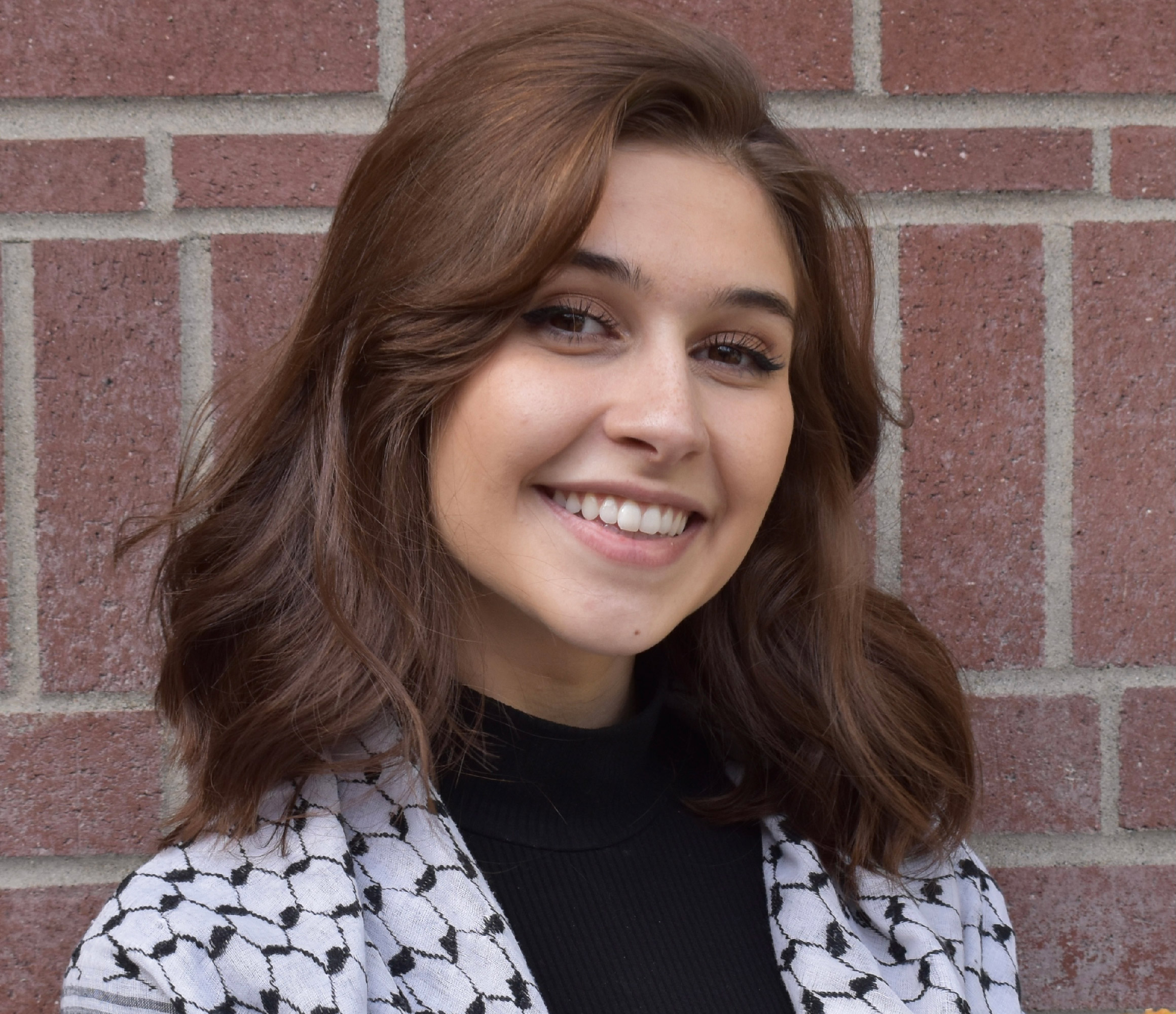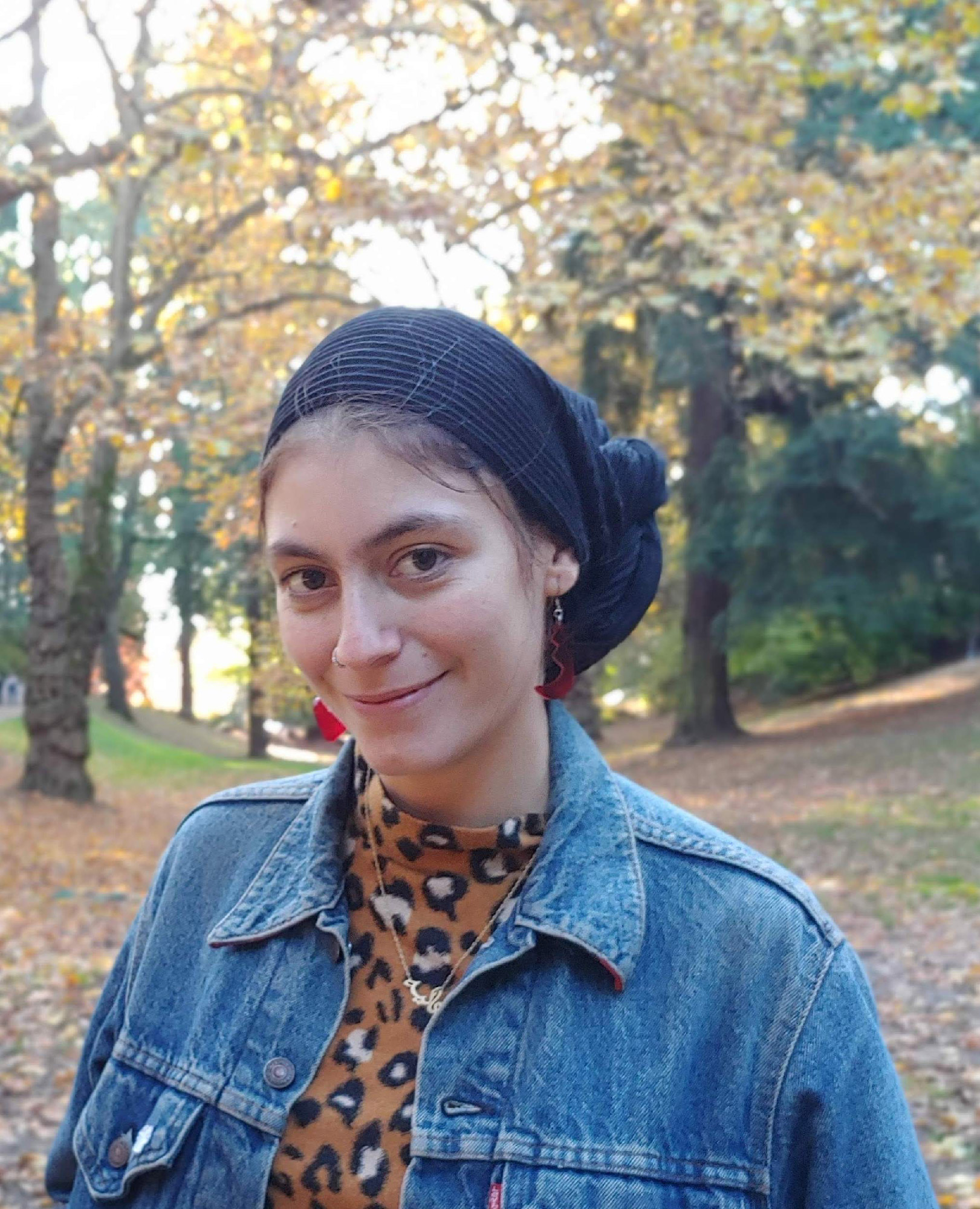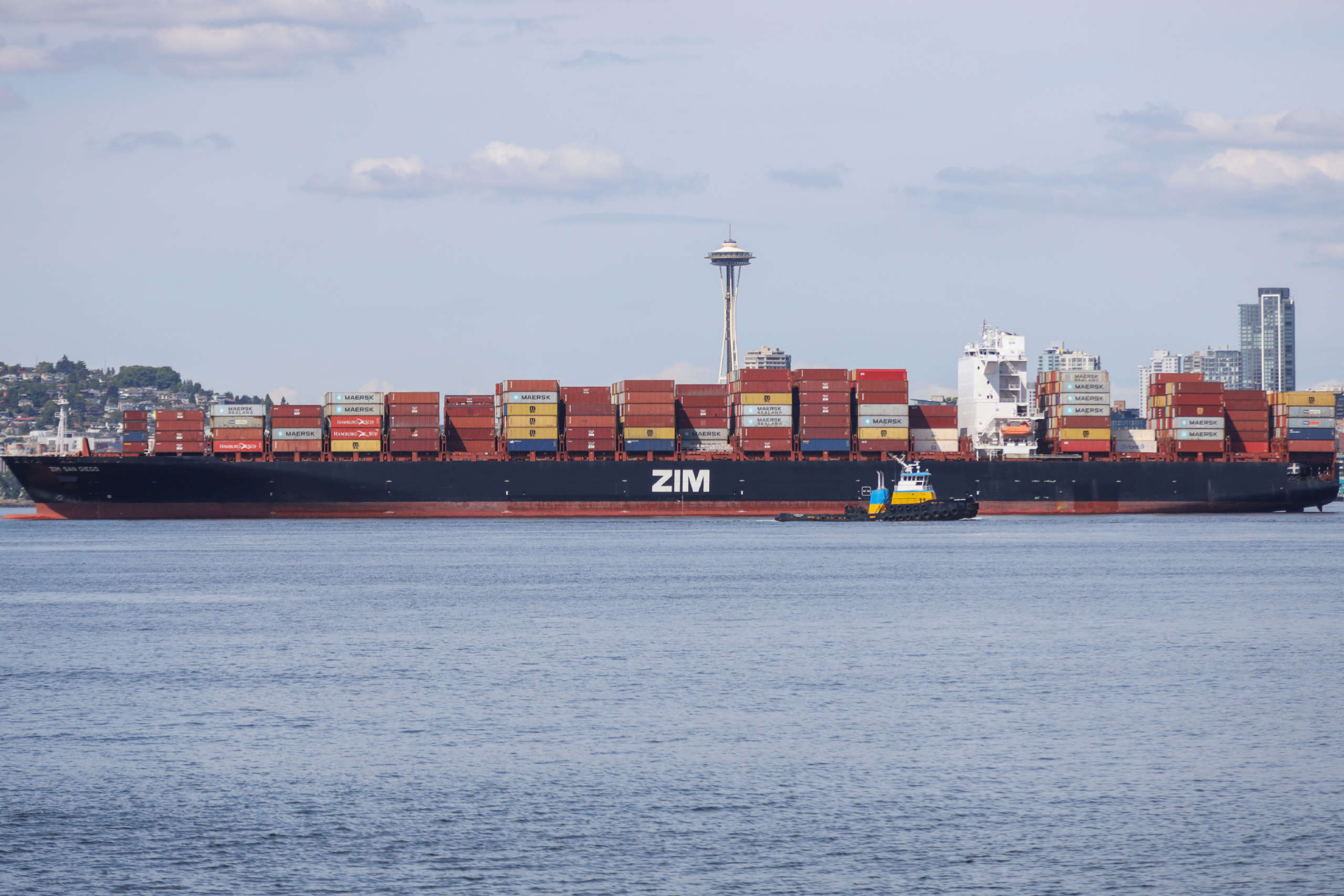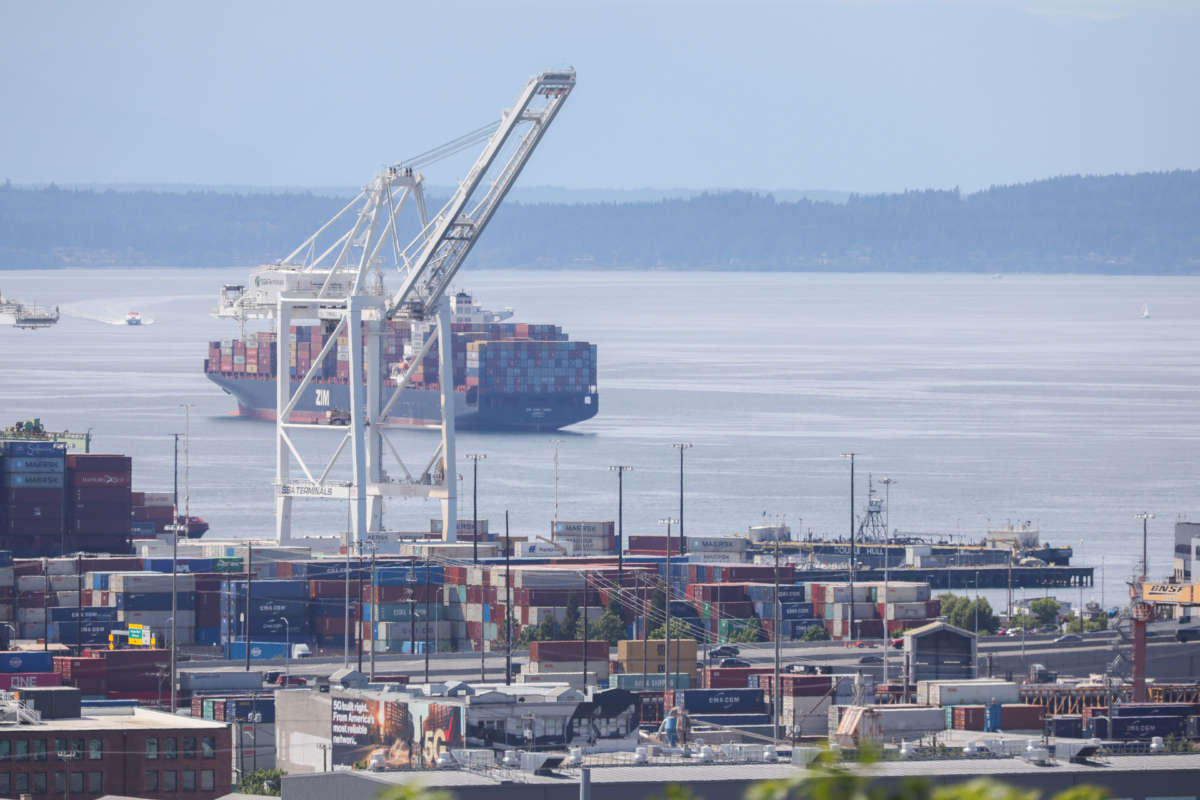Part of the Series
Struggle and Solidarity: Writing Toward Palestinian Liberation
A community picket line in support of Palestinian rights and liberation has succeeded in delaying a vessel operated by Israel’s largest cargo shipping company from docking at the Seattle Port for over a week.
The ship, which belongs to Zim Integrated Shipping Services Ltd. (ZIM) and is known as the Zim San Diego, was originally scheduled to unload its cargo in Seattle on June 2, but has postponed docking in response to the ongoing #BlockTheBoat picket line organized by Falastiniyat, a Seattle-based Palestinian feminist collective. Hundreds of people are expected to show up in protest of the Zim San Diego if it eventually manages to dock.
The current picket line in Seattle comes on the heels of a #BlockTheBoat victory in Oakland, California, where a community and worker coalition led by the Arab Resource and Organizing Center (AROC) successfully blocked an Israeli ZIM ship on June 4 after 17 days of delaying the ship from attempting to dock.
The mobilizations in Seattle and Oakland are part of a coordinated, international #BlockTheBoat campaign that has been taking place across both U.S. coasts, in Canada, South Africa, Lebanon and at European ports. They are part of a global response to the renewed calls for Boycott, Divestment and Sanctions (BDS) made by Palestinian civil society following the most recent Israeli massacre of the Palestinian people in Gaza and violence within the West Bank and the 1948 borders by Israeli military and Zionist vigilante groups.
The current protests also build on a long history of port shutdown organizing, including the #BlockTheBoat protests led by AROC, which blocked Israeli ZIM ships in 2014, as well as the powerful pickets organized by the International Longshore and Warehouse Union (ILWU), which has a long tradition of anti-racist international solidarity and fought apartheid South Africa in the ‘60s, ‘70s and ‘80s. In 1984, members of the ILWU Bay Area’s branches, Locals 10 and 34, refused to unload South African cargo for 11 days, an action which motivated many Bay Area residents to join the U.S. anti-apartheid movement.
Truthout spoke with Aisha Mansour and Alia Taqieddin, co-founders of Falastiniyat, which is leading the current community picket line at the Seattle Port.
Yoav Litvin: Please introduce yourself. What is Falastiniyat? Why are you doing this work?

Aisha Mansour: I was named after my grandmother who was killed by the Israeli military in 1996. My activism and resistance are means for me to honor her name. My family was displaced from the village of al-Walaja in 1948 and now predominantly resides in Aida Refugee Camp, which borders the city of Bethlehem. I am one of the few who has been lucky enough to travel back to Palestine and physically connect with my homeland. It is my hope that one day I will return for good together with the millions of Palestinians who live in the diaspora.
Falastiniyat is a collective of Palestinian feminists living and organizing in Seattle, Washington. While we each have a different relationship to our physical homeland, living in the diaspora and exile; a lifelong commitment to the struggle for Palestinian liberation unites us.
We situate our fight for independence within a larger global anti-imperialist movement and we align ourselves with all of those fighting for Indigenous sovereignty. Each member of Falastiniyat continues a familial legacy of resistance to colonial power. We view the work that we engage in as our obligation to uphold that lineage.
Please introduce yourself. How do you relate to the unique history of racism and settler colonialism in the Pacific Northwest?

Alia Taqieddin: I was raised on stories by my dad, aunts and uncles, and grandmother about our family’s home in Palestine, the forced fragmentation of our family after the 1967 Naksa and Six-Day War, and dreams of return. While some of our family still live in Sabastiya, a village in Nablus, our immediate family has not been able to reenter Palestine since my dad was 5 years old. In 2016, I attempted to visit my uncle and cousins and was denied entry at the same border where we witnessed upwards of 30,000 displaced Palestinians in Jordan breakthrough in May. This is the momentum that keeps me moving. A liberated Palestine means the reunification of our family, and the end to an arbitrary and illegal occupation that keeps us fragmented from our loved ones.
Falastiniyat was borne out of our lived experiences as feminists and Palestinians in diaspora. The history of our collective stems from gendered violence within Seattle — we found one another while individually being confronted by the realities of patriarchal violence. In forming a collective, we built a container to explore and develop a principled approach to our conditions. Our collective positioning in Seattle is that of first questioning the implicit and explicit violence of Zionist settler colonialism, recognizing the role of gendered/sexual violence and oppression within this project, and reclaiming our identities as transnational feminists in exile.
As we challenge the Zionist settler-colonial project, we’re also doing so in the U.S. settler-colonial context. Our feminist framework is inseparable from our decolonial framework. The George Floyd uprisings mobilized us. Falastiniyat formed through the Day of Rage protest last July, where activists and community members in Seattle exposed crucial and damning comparisons between Israel’s illegal annexation of Palestinian land and the city of Seattle’s displacement of Black neighborhoods. Together, we confronted the Seattle Police Department, which actively uses tactics gained by training with the Israeli police as they police communities at home. We identified shared structural sources of our overlapping oppressions, and in doing so, forged pathways to build intercommunal relationships and trust. Many of the groups who shared the stage with us last July are working with us on this action as coalitional partners. As we challenge political alignments that are progressive except on matters of Palestine, we also challenge the notion that Palestinian liberation can be achieved in a silo. We strive to uplift, amplify, and build coalitional relationships with local struggles for sovereignty and justice.
Talk about the #BlockTheBoat action and the coalition behind it. What are your goals?
Mansour: We are participating in an international call to BDS apartheid Israel by blocking a ZIM-operated and -owned shipping vessel from docking at the Port of Seattle. Our goal is to uplift and respond to calls from the Palestinian General Federation of Trade Unions by disrupting Israeli commerce with the United States so long as they are complicit with the occupation of Palestinian land. The Zim San Diego was scheduled to dock on June 2, yet has remained idling in the Elliott Bay for over a week, allowing several other ships to move ahead in line and unload their cargo. At this point, the sitting vessel has cost ZIM, and by extension, the state of Israel, thousands of dollars. Whether the ship docks at the Seattle Port, or decides to dock at a different port in an effort to avoid our protest, our goal to disrupt trade and materially impact ZIM as a profiteer of the Israeli occupation has been met.
ZIM is Israel’s largest cargo shipping company, often dealing in Israeli manufactured military technology, armaments and logistics equipment, which is why our collective has decided to engage in the #BlockTheBoat campaign. Our goal is to build a lasting relationship with the Seattle ILWU in hopes of one day having a Local that explicitly stands in solidarity with Palestinians and Palestinian trade unionists against Israeli apartheid.

How has this campaign progressed?
Mansour: Thus far, our success in picketing ZIM has been through an online campaign, which has received an unprecedented amount of support. Over 1,200 people have subscribed to our text message alert system and are prepared to mobilize when the Zim San Diego tries to dock. Activists from all communities and faiths in Seattle have stepped up to provide security support, mutual aid and committed to political education work centered around BDS. Falastiniyat recently organized the largest Palestinian demonstration in Seattle’s history to commemorate the 73rd anniversary of the Nakba and the simultaneous escalation in violence against the Palestinian people which killed 295, wounded over 3,000 and displaced 90,000 from their homes. We believe this has all been possible because of our dedication to other revolutionary struggles and our alignment with anti-imperialist movements.
This interview has been lightly edited for clarity. Ongoing updates from Falastiniyat will be posted here.
Our most important fundraising appeal of the year
December is the most critical time of year for Truthout, because our nonprofit news is funded almost entirely by individual donations from readers like you. So before you navigate away, we ask that you take just a second to support Truthout with a tax-deductible donation.
This year is a little different. We are up against a far-reaching, wide-scale attack on press freedom coming from the Trump administration. 2025 was a year of frightening censorship, news industry corporate consolidation, and worsening financial conditions for progressive nonprofits across the board.
We can only resist Trump’s agenda by cultivating a strong base of support. The right-wing mediasphere is funded comfortably by billionaire owners and venture capitalist philanthropists. At Truthout, we have you.
We’ve set an ambitious target for our year-end campaign — a goal of $205,000 to keep up our fight against authoritarianism in 2026. Please take a meaningful action in this fight: make a one-time or monthly donation to Truthout before December 31. If you have the means, please dig deep.
